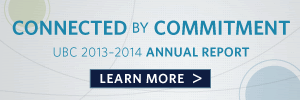Determining the best way to plan and implement a strategy requires an understanding of the current context and other considerations, including:
- Opportunity for a unique role: UBC has an opportunity, as a globally connected institution, to do CE differently and have a positive impact in communities around the world.
- Value academic freedom: Academic freedom is an indispensable quality of research universities. A well-crafted CE strategy will not compromise academic freedom, rather it will support and enable scholars who have been restricted from engaging in CE to expand and enhance their scholarship.
- Respect for different approaches: There are different definitions, methodologies and best practices for CE. One way is not necessarily better or worse than another, however there are also harmful or negative instances of engagement. A CE strategy can guide with principles of how we engage.
- Shared accountability and strategies already in place: Numerous faculties, institutes and units at UBC lead, manage and are accountable for specific aspects of community engagement. Many have developed infrastructures and strategies to support CE; a strong foundation to build upon.
- Strength in the local: While UBC has a global reach, it is a place-based institution embedded within Metro Vancouver, the Okanagan, and the province of British Columbia. There will be strength and concentration in connections with communities in these areas, including Aboriginal communities.
- Indigenous territories: A strategy that engages beyond these campuses has much to learn from protocols, practices, and processes of Indigenous scholars and communities locally, nationally, and internationally. The strategy must also acknowledge and respect that UBC campuses’ are location on the unceded, ancestral and traditional lands of the Musqueam and Okanagan peoples.
- Tenure and promotion: Tenure and promotion is raised in almost every conversation about CE at UBC. Increased understanding and awareness of scholarly CE work can contribute to the tenure and promotion dialogue.
- A focus on CE as scholarly work is not expected of everyone: Not all of UBC needs, wants, or can incorporate CE. UBC will thrive on a strategic division of labour where scholarly specialization spans research and student learning that does and does not include engagement. UBC’s strength lies in the diversity of expertise and passion across the institution.
- Interpersonal relationships are critical: External partners may not see themselves as in partnership with UBC but rather partnering with an individual at UBC. Building a university-wide understanding of CE includes recognizing and building upon the strengths of one-on-one, in-person work.
- Privilege and power: Post-secondary institutions like UBC can be intimidating places of privilege. Connecting with external communities requires working past these real and perceived, historical and current barriers between UBC and outside communities. In addition, varying levels of power exist among relations and partnerships and consideration needs to be given to how principles and practices might unfold differently across relations.
- Understanding impact of CE: Governments and donors are increasingly looking for a measurable return on investment. A good strategy provides the appropriate tools needed to determine success, communicate the collective impact of CE, show accountability and make good decisions.

